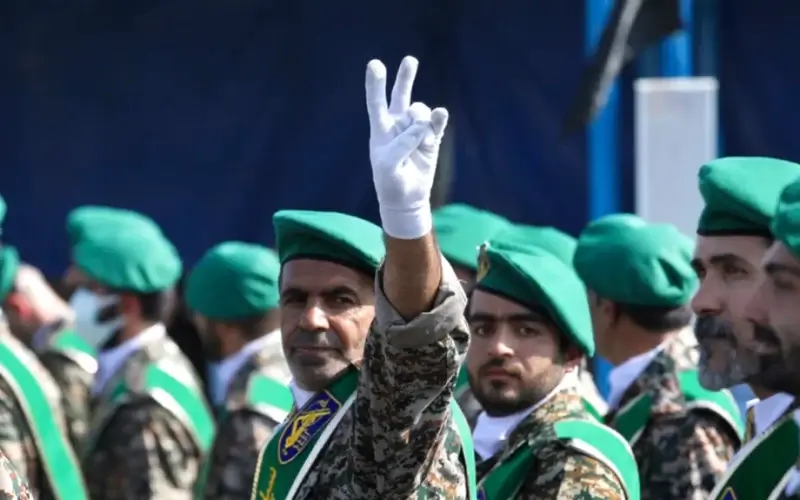As Iranians from all walks of life continue their protests against the Islamic Republic, the regime has called upon its radical Islamic hardliners inside and outside Iran to aid the security forces in their brutal crackdowns against protesters.
Protesters across the country in almost every province have come out in demonstrations for four weeks beginning with outrage that sparked over the death of 22-year-old Mahsa Amini at the hands of the Islamic morality police.
Among the groups that the Ayatollahs in Tehran have called for to help crackdown citizens is the Islamic Basij Resistance Force, a volunteer paramilitary organization linked with the Islamic Revolutionary Guards Corps (IRGC), whose roots go back to the 1979 Islamic Revolution.
After overthrowing the Iranian monarch, Shah Mohammed Reza Pahlavi, the leader of the Islamic Revolution, Ayatollah Ruhollah Khomeini, vowed to create an Islamic government that would spread its ideology throughout the Middle East and the world through any means necessary.
After purging top members of the Iranian military once loyal to the Shah, executing opponents, and creating a new Islamic military force, Khomeini and his new government called for a “20-million-man army” to protect the regime from potential overthrow by insiders and outsiders.
In April 1980, this “20-million-man army" became known as the Basij, which was initially engaged in assisting the Revolutionary Guards and the Revolutionary Committees to secure law and order in highly-populated areas.
When Iraq invaded Iran in 1980, the role of the paramilitary force changed, and poorly trained Basij troops were deployed alongside the regular Iranian military, engaging in "human wave" tactics, which placed them on the frontlines to sacrifice themselves as minesweepers against Iraqi forces.
These human waves consisted of young Iranian boys, ages 14 and up, who would volunteer to clear the landmines and were given keys made in Taiwan to wear around their necks and promised martyr hood and paradise once they died.
At the end of the Iran-Iraq war, the Basij role shifted back to security against Iranian citizens against the regime and the reform movements. The Basij was provided ample funding from the Islamic government and became a policing tool to spy and crackdown against Iranian workers, teachers, and students who said anything negative about the regime or violated Islamic law.
In 1999, under the orders of the IRGC, the Basij were deployed to put down anti-government student protests in Tehran, resulting in what was reported as the death of several individuals and more than 200 injured.
After the election of President Mahmoud Ahmadinejad, branches of the Islamic Republic, like the Basij, became more active in politics, supporting hardliners for administrative offices, and shoring up support from the country's hardline radical Islamic community.
After the 2009 election and the rise of the Green Movement, the Basij were critical in suppressing those who questioned the election results, leading to brutal crackdowns of Iranians on the streets. Different branches of the paramilitary forces mobilized to counter anti-government protests at high schools, universities, factories, and on the streets of Tehran.
While some members of the Basij could not suppress the protests and required help from the IRGC, the Green Revolution ended in brutal suppression from the Islamic government. Since then, Iranian officials have enacted a series of initiatives to indoctrinate and train young Iranian males into the Basij force, transforming them into fully loyal soldiers dedicated to upholding the Islamic government and its teachings. The organizational structure of the paramilitary force 2009 has expanded with offices in each city of Iran, new military equipment, and up-to-date surveillance technology.
Recruits for the Basij are placed in sensitive social housing areas and receive mental and physical training from top officials in the IRGC. Regular members of the Basij consist of unpaid volunteers, whereas active members receive payment for peacetime work.
Many of these volunteers and active members are deployed in plainclothes throughout Iran in universities, schools, government offices, and ordinary jobs, disguising themselves as everyday citizens and reporting on anti-regime activities to their superiors. At the top of the paramilitary hierarchy, the special members of the Basij serve with IRGC ground forces on military operations, receiving enormous benefits and payment.
In 2018, the United States Treasury Department under the Trump administration sanctioned the Basij force by targeting 20 businesses and financial institutions that helped finance the paramilitary force.
Today, the Basij is heavily active in supporting the Islamic regime, supporting security forces in their crackdown against ordinary Iranian citizens protesting the death of 22-year-old Mahsa Amini.
With security forces being overwhelmed in the first few weeks of the protests, Iranian President Ebrahim Raisi and members of the IRGC warned protesters to cease their anti-regime protests to face severe consequences. Despite their calls, Iranian protesters continue their calls for regime change, prompting the deployment of Basij forces in the streets and at universities like Sharif University in Tehran to beat, arrest, and kill protesters.
However, despite the Basij deployment, Iranian citizens are fighting back against them, attacking paramilitary offices using Molotov cocktails and any object they can use. With protests now going into their fourth week in Iran, experts predict that the overwhelming number of protests will prompt the Basij and other Islamic military branches to call outside terrorist proxies to come to Iran and assist in crack downs if they have not done so already.










